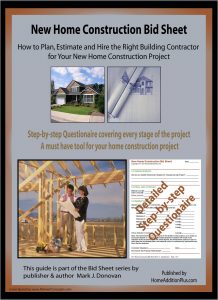First Consider Fluctuating Interest Rates, Home Values, Job Changes or Layoffs and Real Estate Fees
By Mark J. Donovan
|
|
Unfortunately home prices have far outpaced salary increases. Quite frankly that chasm seems to continue to grow. As a result, waiting for growth in your salary to buy the next bigger home is sometimes a poor reason to hold off from buying the bigger home in the first place, particularly if interest rates are low. Once the kids arrive the decision to upgrade to a new home can become even more complex. Particularly when the kids get older and even if you are planning to live in the same general community.
The bottom line: You will probably be in a home much longer than you originally plan. Consequently, it is sometimes wiser to buy more home on your first home purchase rather than less. |
This is particularly true if interest rates are un-naturally low. So before you buy that first home think longer term and buy what you could be happy living in for 20 years, because you just might!Buying a home has been known as the American Dream. But once you’ve bought it, how long should you hold onto it becomes the big question. Well the truth is, most of the time its not your decision to make anyways. Or at least the decision is so painful you hesitate indefinitely to make the next move.
| Fluctuating interest rates and home values, job changes or layoffs, a growing comfortability with the location, realization of new Real Estate fees and closing costs, etc. inevitably effect your decision to make that new home transition.
Most new home buyers say they will stay in the home for a few years then upgrade to a bigger one with all the equity they gain. Others say they will move to a bigger home once they have kids or when their salaries increase. All of these reasons sound reasonable, however much of the time they are not reality. |
 |
In regards to home equity, the unfortunately reality is that home values in the same location rise proportionally to each other. As a result whatever equity you have gained in your starter home, by itself does not increase your purchasing power to buy a larger home.
For help on building a home addition, see HomeAdditionPlus.com’s Home Addition Bid Sheets. Our Home Addition Bid Sheets provide you with the knowledge and information on how to plan a home addition project, and what to look for when hiring contractors. They also include detailed cost breakdown tables and spreadsheets for estimating your own new home addition building costs.
Related Information
- The Causal Relationship Between the Housing Market and Unemployment Rates
- End the Days of Home Slavery
- How to Sell a House Fast in a Declining Real Estate Market
Free Home Addition Price Quotes with No Obligation!
Fill out our 3-5 minute quick and easy form, and receive a free price quote on a house addition from one of our prescreened and licensed home addition contractors. This process is free and there is no obligation to continue once you receive your house addition price estimate.

